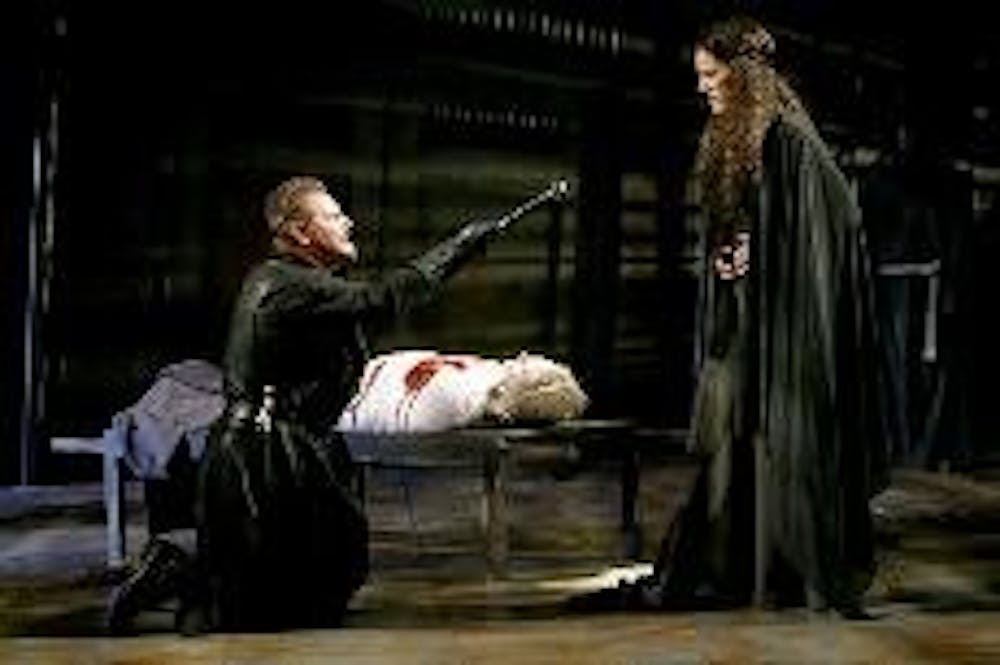"Richard III" is one of Shakespeare's most eternal stories of political corruption. From Napoleon to Hitler to Stalin and recently Saddam Hussein, the play has seen an adaptation of the rise to power of some of the most tyrannical leaders in the last few hundred years.
The play features Richard, Duke of Gloucester, who - after helping his brother Edward depose Henry VI from the throne of England during the War of the Roses - deceptively begins a violently meteoric rise to power.
Disfigured and crippled, the evil Richard uses his sharp wit and cunning to woo his fellow nobles at first and then later turns to the sword to consummate his rule. As such, the play has always well illustrated an abstract case of such a turn of events. The moral of the story is that no one in a position to stop the chain of events attempts to do anything until it is too late.
Normally devilishly portrayed by Geraint Wyn Davies, "Richard III" was played by the equally conniving Jeff Allin, as a substitute. Allin normally plays the role of Sir Richard Radcliffe, a noble in Edward's court.
Fortunately for the audience members, the fact that the late changes to the cast are only slightly less complicated than the royal English lineage itself did not affect the fantastic presentation of the play whatsoever.
Allin was dark, creepy and sadistic. His prowess in keeping a sturdy limp and charismatic snarl was pristine. He sat in order to emphasize his disfigurement and shunned playful contact with the children of the play; Edward, Prince of Wales (Matthew Williams); Richard, Duke of York (Kent Jenkins); and the Son of the Duke of Clarence (Sean McCoy). Allin powerfully maximizes the visualization of his character's depravity.
Other solidly performed characters, such as Cicely Neville, Duchess of York and mother of Richard III (Pamela Payton-Wright), Lord Hastings (Raphael Nash Thompson) and the Duke of Buckingham (Edward Gero) all contributed to the hopeless and terrifying mood of the story. Payton-Wright's appearances served as a motif of foreboding and a representation of those with the foresight to realize Richard's diabolical plans, but who do not or cannot act upon it.
Where Thompson posed a delicious treat to the audience, the conniving Duke of Buckingham (Edward Gero) brought a delectable presentation of betrayal. Allying with Richard, Buckingham assists the "bloody dog's" rise to the throne. In one well-structured scene, Gero and Allin juggle between their true power-hungry selves and the facade they wear for the citizens of England, whom they jointly trick into thinking that they have convinced a noble and generous Richard to assume the throne against his will.
The set seemed to visibly rot and turn to rust. Its industrial and modern feel was only accentuated by it being situated at a constant 15-degree angle. This slant enhanced Richard's evil glow while giving the play a very deranged and penal feel. The wrought-iron spiral staircases and overhanging metal balconies became more of a den of evil to Richard as he fiendishly stole power from the rightful rulers of England.
The play could be likened to a witty and entertaining nightmare, in the most positive sense of the word. This is especially true during the final climactic battle between King Richard III and Henry Tudor, Earl of Richmond (David Gross). Although the attempt to portray horsemen felt a bit contrived when Allin and Gross fought one another directly, the sequence was elegant.
Ultimately, the show was utterly fantastic. Despite the last- minute changes to the cast, Allin managed to deliver a convincing and delightfully diabolical Richard. Running until March 18 at the Washington Shakespeare Theatre, "Richard III" is one tyrant no theater fan would want to leave unnoticed.





